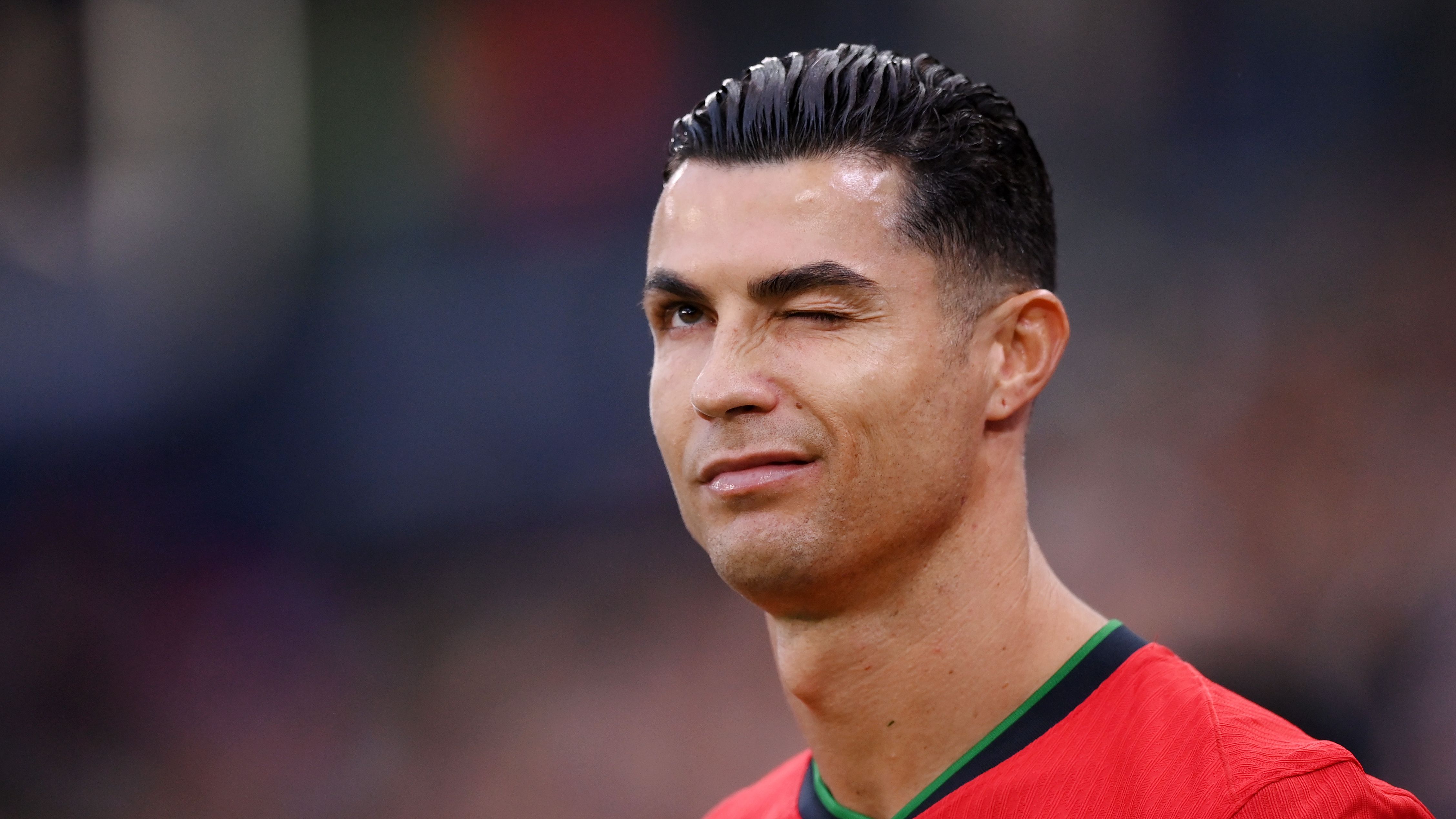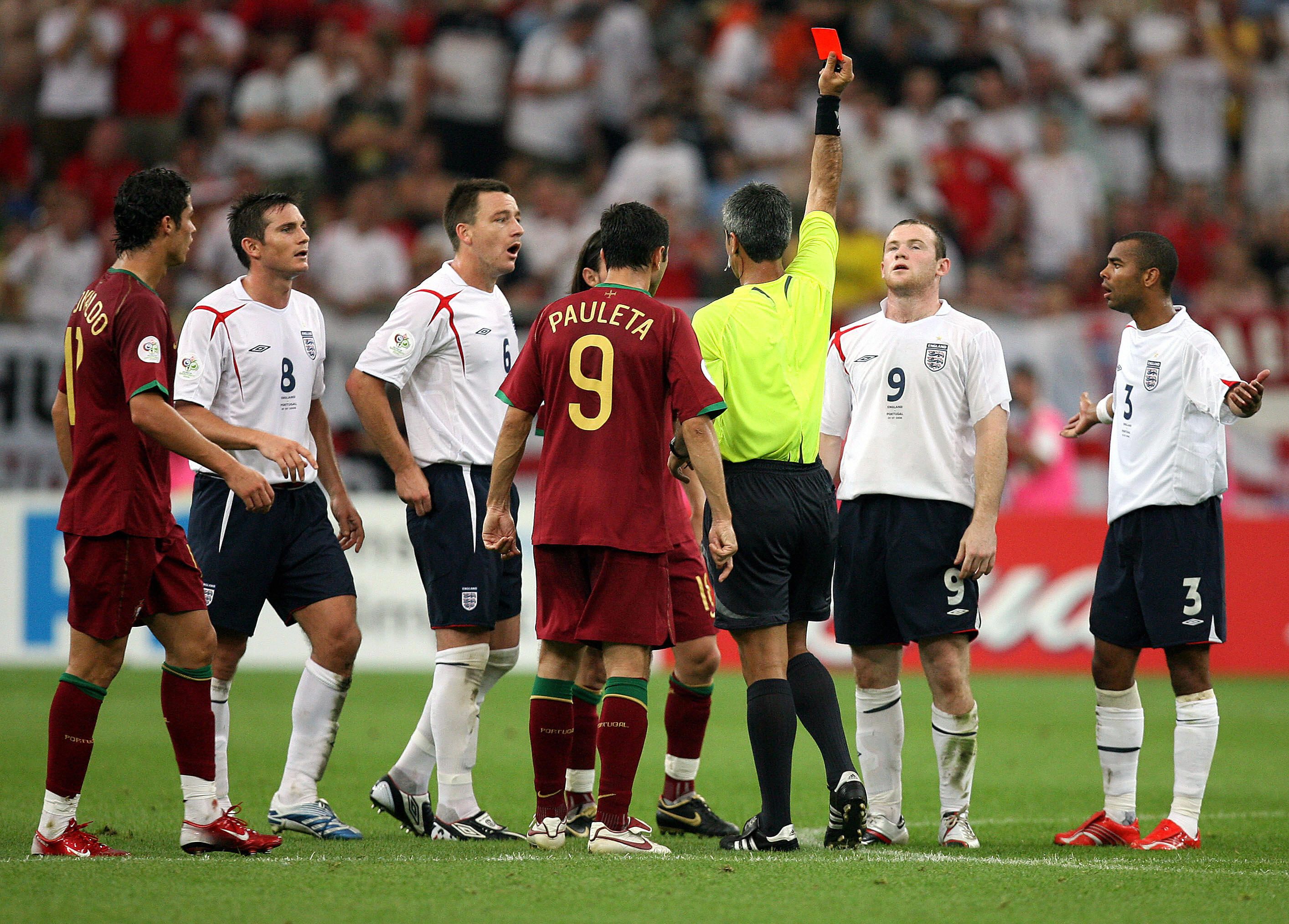

Exclusive Revelations: Wayne Rooney’s Take on Ronaldo’s Iconic Wink and Beyond
In a candid discussion, Wayne Rooney, the Manchester United icon, opens up about the heated moments from the 2006 World Cup and his enduring bond with Cristiano Ronaldo. This fresh perspective highlights how on-field rivalries can evolve into unbreakable partnerships, offering fans a deeper look into the world of elite football.
Wayne Rooney’s Perspective on the 2006 World Cup Controversy
Delving into the heart of the match, the critical turning point during the goalless encounter involved Rooney making contact with Ricardo Carvalho, sparking intense exchanges among the England and Portugal squads. Observers noted Ronaldo whispering to referee Jorge Larionda of Argentina, resulting in Rooney’s dismissal from the game. That notorious gesture Ronaldo directed at his team’s sideline was widely seen in England as a sign of triumph over Rooney’s ejection, ultimately leading to England’s defeat in the ensuing penalty kicks and turning Ronaldo into a target of scorn from British media and supporters.
Forging Ahead: Rooney’s Post-Match Interactions with Ronaldo
Despite the uproar, Rooney maintained that he harbored no resentment toward Ronaldo right after the event. Sharing on his BBC podcast, The Wayne Rooney Show, he recalled, “I chatted with Ronaldo in the tunnel immediately following the match, and everything was fine. I simply wished him well for the semi-final.” This exchange underscores Rooney’s ability to separate professional competition from personal respect.
Strategic Moves and Rival Dynamics During the Game
Rooney also disclosed his attempts to outmaneuver Ronaldo earlier in the contest, noting, “In the opening half, I was working to get Ronaldo cautioned for simulation,” he explained. “If there had been a chance to see him ejected, I would have taken it. During that match, we were adversaries, but once it concluded and we returned to Manchester United, it was all resolved.” This reveals the calculated nature of high-stakes football, where temporary foes can quickly become allies.
The Evolution of Rooney and Ronaldo’s United Partnership
Contrary to speculations from the press and opposing followers eager to highlight divisions between the duo, the World Cup episode did nothing to weaken their camaraderie at Manchester United. In fact, it appeared to enhance their synergy, as evidenced by their dominant 5-1 victory over Fulham in their next outing, where Rooney scored twice and assisted Ronaldo’s goal. This marked the beginning of a remarkable alliance that propelled United to three straight Premier League triumphs and the 2008 Champions League title, with Ronaldo earning his inaugural Ballon d’Or. Their collaboration came to an end when Ronaldo moved to Real Madrid in 2009, while Rooney stayed on at United until 2017, eventually becoming the club’s record goal scorer.
Identifying the Toughest Defenders in Rooney’s Career
When prompted to list the most challenging defenders he encountered in the Champions League, Rooney placed John Terry at the top. Terry, who faltered on a key penalty in the 2008 final against United, stood out for his leadership and defensive prowess. Rooney elaborated: “No doubt about it, John Terry. He was a nightmare to face. I’d always think before games, ‘He’s not the fastest, so I’ll try to exploit the flanks.’ Yet, as a leader when I teamed up with him for England, he was outstanding.”
Terry’s Defensive Strengths and Overlooked Talents
“Terry was all about ensuring the team was prepared, from hotel arrangements to on-pitch execution,” Rooney continued. “His style was robust; he excelled in aerial duels, never shied from challenges, and posed a real danger during corners. He had a way of making every interaction feel intense-he didn’t intend harm, but you’d feel it. I believe he doesn’t receive the recognition he merits for his versatility with both feet.”
Rankings and Insights on Other Top Defenders
Following Terry, Rooney listed his former teammate Gerard Pique as the next toughest, with Paulo Maldini, Ricardo Carvalho, and Alessandro Nesta rounding out the top five. On Pique, he said: “Someone I both played alongside and against. As a young player at Manchester United, he didn’t always get the acknowledgment he deserved. He wasn’t the speediest, but he positioned himself brilliantly to cover for it. His ball-handling skills were exceptional, especially in distributing from defense and launching attacks.”
Pique’s Journey and Physical Challenges
“Off the field, Pique was a true champion with a vibrant personality that made training enjoyable,” Rooney added. “His issue at United was about physical resilience despite his technical brilliance. It came down to a close decision between him and Jonny Evans; we thought Evans was more ready for the Premier League’s demands. Pique struggled in his outing against Bolton, leading the manager to favor Evans and send Pique back to Barcelona. None of us anticipated the stellar path he would forge afterward.”
Recent Developments: Ronaldo’s Return and United’s Future
Ronaldo made a comeback to Manchester United in 2021, experiencing a turbulent period before departing for Al-Nassr after a high-profile interview with Piers Morgan. Meanwhile, the club is considering a mid-season friendly in Saudi Arabia to boost finances, especially without European commitments. With several open dates following their early exit from the Carabao Cup against Grimsby, manager Ruben Amorim may oppose the idea, as it could cut into vital training time amid a poor season start and growing calls for his removal. Rooney has voiced strong doubts, stating he has “no confidence” in Amorim’s ability to steer the team forward.
Background of the 2006 World Cup Quarter-Final
The 2006 World Cup in Germany was a stage for high-stakes drama, and the quarter-final clash between England and Portugal stands out as one of the most talked-about matches in football history. This game, held in Stuttgart, saw England aiming to advance further under manager Sven-Goran Eriksson, with stars like Wayne Rooney and David Beckham leading the charge. On the other side, Portugal, powered by a young Cristiano Ronaldo, was determined to make their mark on the global stage.
What made this match unforgettable was the intense physicality and the mounting tension between players. The England team, buoyed by their group stage successes, faced a resilient Portuguese side that had already knocked out the Netherlands in a fiery round of 16 encounter. As the game progressed to extra time without a goal, frustrations boiled over, leading to the pivotal moment that would define the match and spark widespread controversy.
The Infamous Wink by Cristiano Ronaldo
At the heart of the England-Portugal controversy was Cristiano Ronaldo’s now-iconic wink after Wayne Rooney’s red card. During the match, Rooney, then a 20-year-old prodigy for Manchester United and England, found himself in a tangle with Ronaldo. The incident occurred when Rooney stepped on Ronaldo’s private parts in a heated exchange near the penalty area, leading to a scuffle involving several players.
Referee Horacio Elizondo issued Rooney a red card for violent conduct, a decision that many felt was influenced by Ronaldo’s dramatic reaction. Immediately after the call, television cameras captured Ronaldo winking towards the Portuguese bench, a gesture that was interpreted as glee or mischief. This 2006 World Cup wink quickly became a symbol of gamesmanship in football, with fans and analysts debating whether it was a sign of Ronaldo’s cunning or just poor sportsmanship.
The wink went viral in the pre-social media era, dominating headlines and fueling discussions about fair play in high-pressure tournaments. Keywords like “Cristiano Ronaldo 2006 World Cup wink” still trend in searches related to football controversies, highlighting how this single moment encapsulated the emotional highs and lows of international competition.
Wayne Rooney’s Insights and Revelations
Wayne Rooney, who has since shared detailed insights into the incident, offers a unique perspective as someone directly involved. In various interviews and his autobiography, Rooney has described the event as a misunderstood clash of emotions rather than personal vendetta. He revealed that the altercation stemmed from the physical demands of the game, with both players pushing limits in a bid to gain an edge.
Rooney’s revelations provide valuable information for fans interested in the human side of football. He explained that Ronaldo’s wink wasn’t necessarily directed at him maliciously but was more about relieving tension after a tough match. “It was all part of the game, but it hurt at the time,” Rooney once said, emphasizing how such incidents can affect team morale and player relationships. These insights from Rooney on the 2006 World Cup controversy have helped demystify the event, showing it as a learning experience rather than just a scandal.
The Controversy and Its Impact on England-Portugal Relations
The aftermath of the red card and wink led to a firestorm of criticism, particularly in England, where tabloids labeled Ronaldo as a villain. This 2006 World Cup England-Portugal controversy strained relations between the two national teams and even affected club dynamics at Manchester United, where Rooney and Ronaldo were teammates. The English media’s backlash included calls for FIFA to investigate, though no formal action was taken.
Over time, this incident highlighted broader issues in football, such as referee influence and player behavior under pressure. Rooney’s later comments have helped bridge gaps, with him noting that he and Ronaldo reconciled quickly, maintaining their professional partnership. Searches for “Wayne Rooney insights into Cristiano Ronaldo wink” often reveal how these events fostered discussions on mental resilience in sports.
How This Incident Shaped Sportsmanship in Football
Exploring the benefits of analyzing such controversies, we can draw practical lessons for modern footballers. One key benefit is understanding the importance of emotional control; Ronaldo’s wink, while instinctive, showed how actions can escalate tensions and affect team dynamics. Practical tips for players include focusing on mental training to handle confrontations, such as using deep breathing techniques or positive visualization during matches.
Additionally, coaches can use this as a case study to teach about fair play, emphasizing that while competition is fierce, respect between rivals builds long-term credibility. For fans, it underscores the need to support players without fueling unnecessary divides, promoting a healthier football community.
Case Studies of Similar Incidents in Football History
Football history is rife with moments that mirror the 2006 World Cup wink controversy, offering case studies for comparison. For instance, during the 2010 World Cup, Luis Suarez’s deliberate handball against Ghana denied them a goal, leading to penalty drama and accusations of cheating. Like Ronaldo’s wink, Suarez’s actions sparked debates on ethics, with Uruguay advancing as a result.
Another example is Zinedine Zidane’s headbutt in the 2006 World Cup final, which ended his career on a sour note. These case studies illustrate how individual actions in crucial games can alter narratives, much like Rooney’s red card did for England-Portugal relations. By examining these, fans gain a deeper appreciation for how 2006 World Cup controversies influence rule changes and player conduct in today’s game.
First-Hand Experiences from Players Involved
Drawing from first-hand experiences, Rooney has often shared how the incident affected his career trajectory. In retrospective interviews, he discussed the isolation he felt after the red card, saying it motivated him to mature as a player. Ronaldo, too, has reflected on the wink, admitting it was a youthful mistake that taught him about public perception.
These personal stories add depth, showing that behind the headlines, players like Rooney and Ronaldo navigate complex emotions. Such revelations make the 2006 World Cup England-Portugal controversy a timeless topic for learning about resilience and growth in professional sports.









